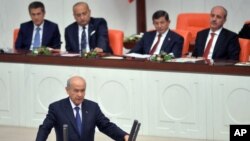Turkey's efforts to cobble together a ruling coalition are under powerful pressure to succeed amid growing economic concerns, a faltering peace process with Kurdish rebels, and a Syrian civil war on Turkey's borders.
The coalition building process is predicted to be a difficult one, with major obstacles ahead.
Turkish President Recep Tayyip Erdogan has officially asked to Prime Minister Ahmet Davutoglu to form a new government. The AK Party lost its majority in parliament in last month's general election, but remains the largest party.
Under Turkey’s constitution, AK Party leader Ahmet Davutoglu has 45 days to form a coalition government. He said his first round of meetings with the three other party leaders will continue until July 15.
Political columnist Kadri Gursel of Turkey’s Milliyet newspaper said all the opposition parties know there are considerable risks in the process.
"Any party who would create a partnership would suffer without solving corruption," he said. "The minimum precondition is opening the way for a trial of the four former ministers that have been involved in the first corruption case. And the second is the Erdogan factor."
The nationalist MHP Party is widely seen as the most compatible coalition partner for the AK Party. But its leader, Devlet Bahceli, like other opposition party leaders, has called for the reopening of probes into alleged high-level corruption during the AK Party’s rule.
All opposition leaders have also called for President Erdogan — the former leader of the AK Party — to step back from interfering in day-to day-politics.
For now both demands have been dismissed by Davutoglu. But political scientist Yuksel Taskin said reestablishing ties with the Kurdish rebel group the PKK, remains an important force to forming a government.
"At least the three actors — AKP, CHP, and the HDP — realize that the peace process must continue for a variety of reasons," he said.
The largest opposition party's CHP and the pro Kurdish HDP are committed to restarting the stalled peace process with the PKK. Observers say an end to the process could threaten to throw the country into chaos, when it is already struggling to deal with the Syrian civil war on its borders.
Taskin said the electorate will be watching carefully how the opposition parties behave.
"They have to prove to the voters that they can shoulder the responsibility of ruling Turkey," he said. "If they give the message that we are just opposition parties — we are not ready to share power — that would also have a very, very negative impact on their future performance."
If the coalition efforts fail, under the constitution, a general election has to be held within 90 days. For now, opinion polls indicate the outcome would be similar to June’s poll. But observers warn that voters are likely to punish the party they deem responsible for the failure of the coalition talks.




